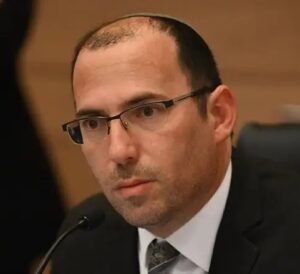The world is mad. One only need read the news to recognize this (which is why some opt to ignore the news these days). Sadly, Israel has not been immune, nor should we have expected this would be the case.
For half a year now, we have been struggling with a most disturbing, irrational, and ugly undercurrent that has threatened the cohesiveness of our society and our national stability.
What I am now seeing now, and am encouraged by, are indications of a reduction in the manifestation of this derangement. Reduction: we are not yet past it, but there is cause for hope.
~~~~~~~~~~
My reference, of course, is to the behavior of certain opponents of judicial reform who have sought to disrupt the nation. These opponents can be divided roughly into two groups. There are those who sincerely believe that the judicial reform being advanced by the government is detrimental to Israel. Incited by leaders who have cried unendingly about the destruction to Israel’s democracy that will be brought about by the reform, their concerns are genuinely felt.
Whether these concerns are valid or not has become beside the point, as they are convinced. I have talked with such people. At least until very recently, they have expressed a belief that there is a moral imperative to take to the street.
Unfortunately, their grasp of the issues is not always strong. The fact that esteemed attorney Allan Dershowitz, who is actually against the reform, has made it clear that it would have no effect on democracy, did not dilute their concerns. Nor were they impressed by the fact that the reform would make Israel’s judicial system more like America’s or that of other western democracies. Or, for that matter, the cogent argument that removing some of the power of the Court, which is not selected by the people, and putting it in the hands of the people’s elected representatives in Knesset, would actually make for a more democratic system.
Doesn’t matter. They have been out there, doing their “thing” – exercising their right to protest and disrupting the nation in the process.

~~~~~~~~~~
Then there are those who hang resentment about a right-wing electoral win – and the renewed premiership of Netanyahu – on the hook of judicial reform. Opposition to the reform gives them focus for huge, not-so-peaceful demonstrations, which, it is hoped, will ultimately bring the government down.
Key among these are the leaders of the opposition, who are promoting the not-so-peaceful demonstrations. This means Yair Lapid (Chair Yesh Atid); former (Labor) PM Ehud Barak; former (Kadima) PM Ehud Olmert; and a handful of others, including former Minister of Defense Moshe Ya’alon. They are politically motivated, inciteful, and destructive. In some instances, their behavior borders on treason.
Most pertinent here is the fact that they are not sincere in their concerns about Israeli democracy. Were they motivated by genuine love of Israel, it would be a different story. But they are motivated by a quest for political power and hatred of Bibi.
See here two different quotes from Yair Lapid (with emphasis added). In the first he is expressing opposition to the reasonableness clause in an address delivered prior to the current political situation:
“…I don’t think it is right for the Supreme Court to change fundamental things in accordance with what it refers to as the judgment of ‘the reasonable person.’ That’s an amorphous and completely subjective definition that the Knesset never introduced to the legal code. It’s not right in my mind that the separation of powers, the sacrosanct foundation of the democratic method, should be breached by one branch of government placing itself above the others.”
https://www.jns.org/its-not-about-democracy/
But more recently, Lapid changed his tune and said this:
“If the reasonableness clause is abolished, all lines will have been crossed. It will demolish the authority of the Supreme Court and our democratic structure.”
https://www.jns.org/jns/israel/23/7/11/301730/

From where I sit, the behavior of Lapid and associates is shameful. But they have a hardcore following.
~~~~~~~~~~
I specifically referred to the reasonable clause now because that is the issue that is front and center in the Knesset.
~~~~~~~~~~
Back in March, the turmoil in the nation because of the demonstrations was so severe, involving a blockage of the airport at one point, as well as blockage of roads, etc., that Prime Minister Netanyahu paused legislation on judicial reform that was being advanced by the government. Instead, it was agreed that, in an effort to move past the impasse, negotiations would be held at President Herzog’s house with Herzog as mediator.

Netanyahu made the move he did because of concern for the fabric of the nation; the blocking of the airport was a major factor. (More on this below.) For the opposition, this was a win: their tactics worked and they were emboldened.
The negotiating effort did not go well, however, which comes as no surprise. In the first place, the proper venue for debate on the issues is the Knesset, not the residence of the president.
In the second, Herzog – who is clearly a leftist and has behaved in a manner that marks him as one – failed to demonstrate impartiality in his role as mediator. Finance Minister Bezalel Smotrich (chair, Religious Zionists) publicly charged that the president was not acting as a fair mediator.
https://www.jpost.com/israel-news/article-746953
After weeks in which there were no agreements on any of the reform issues, the coalition was convinced that negotiations were not being held in good faith but were a stalling tactic.
~~~~~~~~~~
In June, secret ballot elections were held in the Knesset for the two Knesset members of the nine-member Judicial Selection Committee. It was a convoluted affair that confused many and ended very indecisively. Traditionally, the coalition and the opposition each have one representative, but this time the coalition had hoped to secure both seats. In the end, the Yesh Atid (opposition) candidate, Energy Minister Karine Elharrar, was elected, and the second Knesset seat was left unassigned.
To further complicate matters, this election was held under the old rules and Justice Minister Yariv Levin (Likud) still hopes to secure a restructuring of the committee. He had no plans to convene the Committee.

For a review of the details:
https://arlenefromisrael.info/from-israel-and-what-happens-now/
~~~~~~~~~~
At this point, opposition head Lapid declared that there would be no more negotiations at Herzog’s house until the Selection Committee was convened.
For the coalition, this was a moment of truth. There would be no more meetings at the president’s house. The attempts to reach compromise agreements had born no fruit, in any event. The negotiations could have continued even if the Selection Committee was not convened, but the opposition preferred to stall.
It was time to move on, advancing the legislation in the Knesset.
~~~~~~~~~~
And so we arrive at this week. On Monday night, the legislation on limiting use of the reasonableness standard was brought to the Knesset plenum for a first vote. It passed, 64 to 56, along party lines.
http://www.israelnationalnews.com/news/373960
The reasonableness standard allows the Court to void executive decisions if they are outside the bounds of what the justices decide is reasonable. This is subjective, as it relies upon a justice’s perception of what is “reasonable,” and shifts the balance of power in favor of the Court.
Undoubtedly, I will be returning to this and may well provide examples in time.
~~~~~~~~~~
The opposition had warned that there would be massive demonstrations across the country if this passed. And so, Tuesday was a “Day of Resistance.” The opposition set out to cause disturbances.
But this is where I saw diminished derangement.
It was ugly, make no mistake about it. That was the intention. Demonstrators blocked main roads – which they are not supposed to do, sometimes setting fires in the middle of the road.

Emergency Response teams had implored the protestors not to block the roads in a manner that might prevent ambulances from getting through, but the protestors ignored the plea: In one particular instance, a 10-year-old boy with a life-threatening allergic reaction was caught in an ambulance for almost an hour because the road was blocked. For this and similar actions, there is no excuse.

The protestors went to the airport to block normal procedures there. And they demonstrated at key venues such as the Knesset and outside the homes of top members of the coalition.
~~~~~~~~~~
But here’s the thing: There were significantly fewer protestors!
This is how Alex Traiman, writing in JNS, described the situation:
“…the latest anti-reform protests were barely a fraction the size of earlier ones. Left-wing media outlets—the majority of Israeli media—that previously boasted maximalist size estimates of earlier protests numbering in the tens or hundreds of thousands, now stated only that ‘masses’ of protesters had taken to the streets. During protests last week, in which a few hundred people blocked Tel Aviv’s Ayalon Highway with a bonfire, outlets were claiming that the protests evoked scenes similar to those seen in March. Instead of wide-angle aerial photographs, outlets are increasingly relying on closer-angle shots of protesters.
https://www.jns.org/israel-news/benjamin-netanyahu/23/7/12/301894/
Has the steam gone out of the protest? Are some re-evaluating the situation? Or just tiring of it?
Traiman sees something else:
“…the current protests are by no means spontaneous, and the true nature of the protest movement’s die-hards and its organizers have been on full display.”
Whatever the reasons, the anti-coalition movement is losing clout, and this is encouraging.
~~~~~~~~~~
I would like to think that some of those who are sincere about protecting Israeli democracy might have decided that they’ve had enough of Lapid, with his alarmist, hyper-inflated rhetoric. This is what he said this past week about the reasonableness legislation:
“This law will harm the livelihood of every citizen…the law will make Israel weaker, poorer, more isolated.”
http://www.israelnationalnews.com/news/373986
Because of a law that would limit the ability of the Court to overrule the decisions of Israeli officials?
Perhaps a growing number of Israelis is tired of his tirades.
Routinely Lapid threatens dire fiscal problems because of the judicial reform. And so, I want to point out once again that there are no fiscal consequences to the legislation. If there is a fiscal downturn it would be because of the unrest generated by the demonstrations, which might make people, and corporations, uneasy about investing in the country. The opposition is harming the country.
~~~~~~~~~~
And there is yet more good news. There has been a good deal of criticism leveled at police and other officials because of the laxness with which they have responded to disruptive demonstrations. What is more, the evidence is that left-wing demonstrators are routinely handled more gently than those on the right.
We had a police official in Tel Aviv, Ami Eshed, who defended his leniency by saying he was preventing civil war, while our attorney-general, Gali Baharav-Miara, claimed, “There can be no effective protest without disturbing the public order.” Netanyahu declared himself “shocked” by her statement.
And so, this past Tuesday, the police were tougher. And there were some 66 arrests, while during past demonstrations there were very few.
~~~~~~~~~~
Following the first vote in the plenum, the legislation returned to the Constitution, Law and Justice Committee, chaired by MK Simcha Rothman (RZ) for debate and discussion, as is normal procedure.

That’s where it is now, and already there is news of adjustments being made that will water it down. Ultimately the legislation will be brought back to the Knesset for a second and third reading, after which it is law.
Simcha says that how quickly it will return to the Knesset depends on “how many questions there are.” If it isn’t brought back by next week, it will not be for lack of effort on the part of coalition. Already there are objections from the opposition to modifications that were made. Objections slow the process down.
~~~~~~~~~~
And so, while I have indicated movement in the right direction with regard to this painful issue, it is important that I not leave you, my readers, with an over-optimistic picture. As the legislation moves closer to approval, the leaders of the opposition fight ever harder to prevent it from happening. They are, in fact, panicking.
Now the protest leaders have announced:
“With the worsening and progress of the legislation, the organizations are calling on the general public to come out en masse and participate next Monday in the National Day of Resistance in order to stop the legislation that will result in severe damage to the army, the crushing of the Israeli economy, and a rift in the nation.”
http://www.israelnationalnews.com/news/374106
How ugly, how wearying, how disgusting. They are trying to draw in the entire country and we must pray that the response will be no greater than it was last Tuesday. They do damage to our nation.
~~~~~~~~~~
I will, of course, be following this next week. Here I will note that:
[] The Knesset on Wednesday voted for MK Yitzhak Kreuzer (Otzma Yehudit) to be its second representative on the Judicial Selection Committee. Now there will be pressure on Minister Levin to convene the committee.
[] Opposition head Benny Gantz (National Unity) then proposed that the negotiations be resumed. This is not going to happen.
~~~~~~~~~~
I intend to take advantage of a badly needed rest over Shabbat, and I hope my readers will do the same.
~~~~~~~~~~
© Arlene Kushner. This material is produced by independent journalist Arlene Kushner. Permission is granted for it to be reproduced only with proper attribution.
